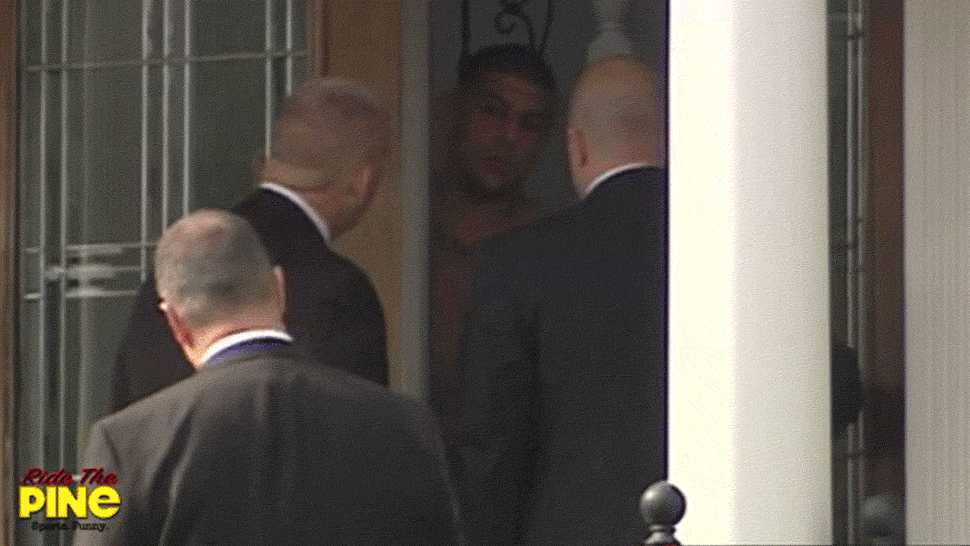The Most Shocking Aspect of the Aaron Hernandez Case Isn't That He May Have Killed Someone
It's that a suspected murderer received better treatment than a nonviolent drug offender simply because of his wealth.
Last Wednesday New England Patriots tight end Aaron Hernandez was charged with murder for "orchestrating the execution" of Odin Lloyd, a semi-pro football player who Hernandez had known for about a year. I didn't pay the story much attention—until I saw footage of Hernandez being arrested.

Let me paint the scene for you: It's broad daylight out. A group of six Massachusetts State Police officers in suits and ties approach Hernandez's North Attleborough mansion from the front. Three of them walk up the steps of his porch, and—with their guns holstered—knock on the door. After roughly 50 seconds of knocking and doorbell-ringing, a shirtless Hernandez opens the door and lets six suited staties, plus a cop in uniform, come inside. As one officer starts to cuff Hernandez right there in the foyer, another officer closes the door, presumably to provide Hernandez with some privacy. A few seconds later, Hernandez—now with a tee-shirt pulled over his handcuffed arms and torso—is led outside to a cop car, where officers gently lower him into the back seat and put on his seatbelt.
Don't believe me? Watch the arrest below:
No battering ram. No flashbangs. No paramilitary gear. I was shocked.
Now, it's entirely possible that Hernandez knew he was going to be arrested that morning. That after a week or so of questions and the issuance of a warrant, his lawyer had arranged for Hernandez to go peacefully. This scenario would explain the troopers' suits and lack of tactical gear, why they knocked on the door instead of knocking it down. It would also be an incredible courtesy to show to a murder suspect who had "intentionally destroyed his home security system, [smashed his cell phone], and hired a maid service to clean his home on Monday, the day Lloyd's body was discovered."
In other words, the type of courtesy never shown to someone like Eurie Stamps of Framingham, Mass., whose story was first covered at Reason by Radley Balko.
In 2011, a SWAT team conducted a midnight raid on Stamps' home in Framingham looking for a couple of small-time crack dealers. In the chaos and cloud of adrenaline that results from knocking down someone's door and flooding his home with men dressed like soldiers, an officer shot Stamps in the neck, killing him. The city's chief of police would later say that Stamps was "tragically and fatally struck by a bullet which was discharged from a SWAT officer's rifle"; as if guns fire themselves.
When police eventually found who they were looking for—not Stamps, but his stepson and the stepson's cousin—neither of them was armed. Nor did police find any firearms in the house.
It almost sounds backwards, doesn't it? Killing an unarmed senior citizen in the process of arresting two unarmed kids holding a couple hundred bucks and some crack, while sending guys in their Sunday best to bring in a man allegedly involved in not just one violent, gang-related murder, but three?
While I don't think police should've used a SWAT team on Hernandez—he'd already submitted to questioning earlier in the week—the deference police showed him from the start of their investigation is kind of amazing. It's the kind of treatment Chappelle's Show parodied with "Tron Carter's Law & Order," in which a black crack dealer gets to decide when the police arrest him and what they charge him with:
This trend isn't limited to Massachusetts. Across the country, poor people experience an entirely different criminal justice system—from arrest to prosecution—than the wealthy. Oftentimes, this means blacks are treated more harshly than whites and that the people who sell illegal drugs for money are treated differently than bankers who launder that money.
While football fans are free to care about whatever they want, the most shocking aspect of the Hernandez case isn't that an incredible athlete killed anywhere from one to three people, it's that the location of his home and the name of his employer bought him courtesies that poor, nonviolent offenders committing consensual crimes seldom experience.


Show Comments (71)